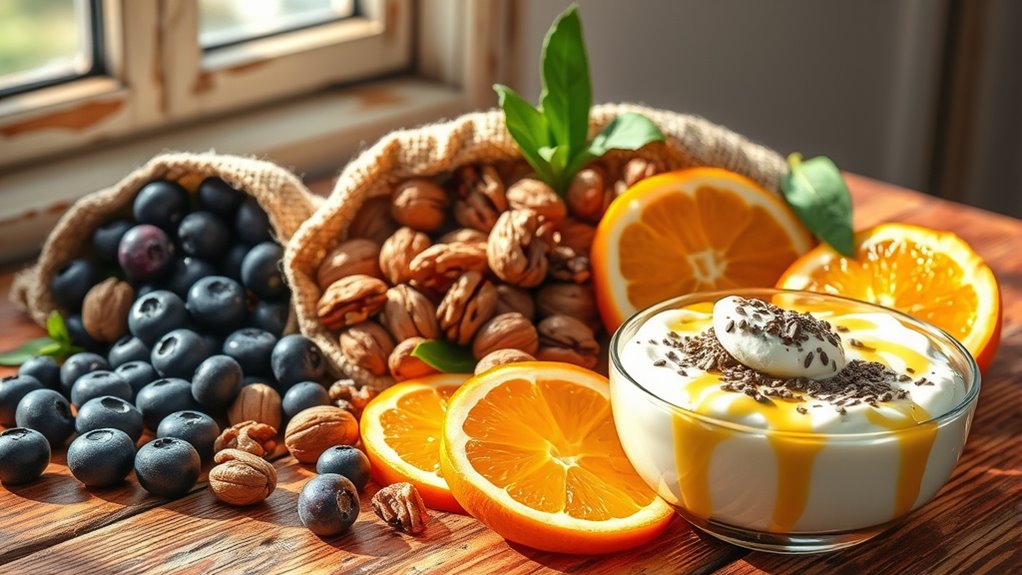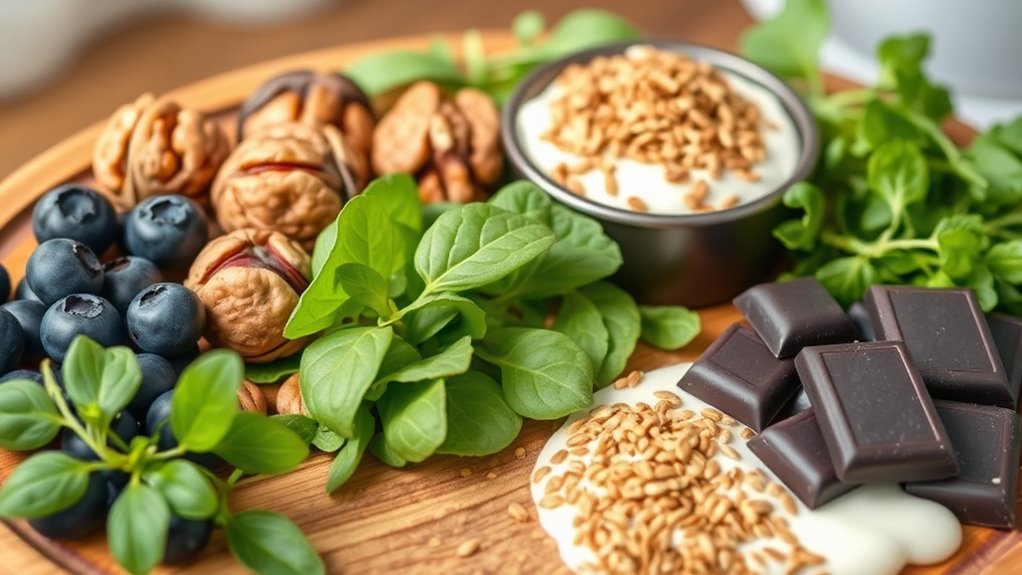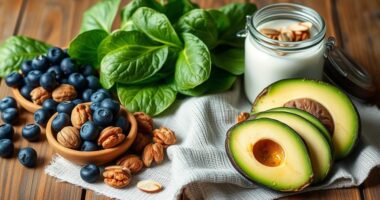To boost your memory after 40, include nutrient-rich foods like fatty fish, berries, nuts, and leafy greens in your diet. These provide essential omega-3s, antioxidants, and vitamins that support brain health and cognitive function. Herbs like rosemary, turmeric, and ginkgo biloba can also enhance blood flow and reduce inflammation. Small changes in your meals, combined with a healthy lifestyle, can make a noticeable difference—discover more ways to support your mental clarity as you age.
Key Takeaways
- Incorporate fatty fish like salmon for omega-3 fatty acids that support brain function.
- Add berries such as blueberries for antioxidants that reduce neural inflammation.
- Consume nuts and seeds, especially chia seeds, for nutrient-dense brain-boosting fats.
- Include leafy greens like spinach and kale to provide vitamins essential for cognitive health.
- Use herbs like rosemary, turmeric, and ginkgo biloba in meals or teas to enhance blood flow and mental clarity.

As you age past 40, maintaining sharp memory becomes increasingly important, and the right foods can play a significant role in supporting cognitive health. While many people focus on vitamins and antioxidants, don’t overlook the power of brain boosting herbs. These natural supplements have been used for centuries to enhance mental clarity, improve concentration, and protect against age‑related decline. Herbs like ginkgo biloba, rosemary, and turmeric are known for their ability to boost blood flow to the brain, reduce inflammation, and support neural function. Incorporating these herbs into your diet or supplement routine might help keep your mind sharp longer. However, it’s also essential to be cautious of nutrition myths that can lead you astray. Some believe that eating specific “brain foods” alone will dramatically improve memory, but the truth is more nuanced. A balanced diet rich in whole foods, healthy fats, and nutrient‑dense vegetables offers the best foundation for cognitive health. Relying solely on supplements or superfoods without considering overall diet quality won’t deliver the desired results. It’s also a common misconception that high doses of certain nutrients can replace good eating habits. Instead, focus on a variety of nutrient‑rich foods that support brain health, such as fatty fish, berries, nuts, and leafy greens. These foods provide essential omega‑3 fatty acids, antioxidants, and vitamins that work synergistically to protect your brain cells. Incorporating herbs into your meals or as teas can be a delicious way to enhance your diet, but always consult with a healthcare provider before starting any new supplement, especially if you’re on medication. Remember, no single food or herb is a magic bullet; maintaining a healthy lifestyle overall—regular exercise, good sleep, mental stimulation—is equally critical. Understanding the science behind brain health can help you make more informed dietary choices. Additionally, proper storage of herbs can preserve their potency and effectiveness, ensuring you get the full benefit. To truly support cognitive longevity, it’s helpful to incorporate a variety of nutrient sources, as diverse nutrients work together to optimize brain function. Including Chia Seeds in your diet can be an easy way to boost omega-3 intake, which is vital for brain health. Incorporating Crochet styles for locs in your routine can also promote scalp health and reduce stress, indirectly benefiting mental well-being. Be wary of quick fixes or sensational claims that promise overnight memory improvements. Instead, aim for consistent, sustainable habits that support your cognitive health over the long term. By understanding the role of brain boosting herbs and debunking nutrition myths, you can make smarter choices that truly benefit your memory. Whether it’s adding a sprig of rosemary to your dish or enjoying a cup of turmeric tea, small dietary shifts can have meaningful impacts. Ultimately, nurturing your brain with the right foods and herbs, combined with a healthy lifestyle, helps you stay sharp and engaged well into your later years.
Frequently Asked Questions
Are Memory-Boosting Foods Effective Without Lifestyle Changes?
You might wonder if memory-boosting foods alone can improve your brain fog without changing your lifestyle. While eating nutrient-rich foods can help, they’re most effective when combined with regular exercise, proper sleep, and managing dietary restrictions. Relying solely on foods may not produce significant results, but they support your overall brain health. To truly boost memory, you need a holistic approach that incorporates healthy habits alongside a balanced diet.
Can Specific Foods Reverse Age-Related Memory Decline?
You wonder if specific foods can reverse age-related memory decline. While they might help reduce brain fog and improve mental clarity, they aren’t magic cures. Eating nutrient-rich foods like berries, nuts, and fish supports brain health, but lifestyle changes like exercise and sleep are essential too. Combining healthy eating with overall habits enhances your chances of maintaining sharper memory and mental clarity as you age.
How Quickly Can I See Improvements From Memory Foods?
Think of your brain as a garden; with the right nutrients, you can clear away the fog and see blooms of clarity. You might notice a cognitive boost within a few days to weeks, as foods rich in antioxidants and healthy fats nourish your mind. While immediate results are rare, consistent eating habits can gradually improve memory, helping you combat brain fog and sharpen your focus over time.
Are There Any Side Effects From Consuming Memory-Enhancing Foods?
You might wonder if memory-enhancing foods have side effects. Generally, they’re safe, but watch out for food allergies that could cause reactions. Also, nutrient interactions might affect how your body absorbs certain vitamins and minerals, leading to unwanted effects. Always check ingredient labels and consult your doctor if you have allergies or take medications, to avoid adverse reactions and guarantee these foods support your memory health safely.
Do Supplements Work Better Than Natural Memory Foods?
Think of your brain as a garden; supplements are like high-tech fertilizers, but natural foods are the sunlight and water. Supplements often have better or faster absorption, but natural memory foods provide a balanced mix of nutrients and fewer synthetic additives. While some supplements may work faster, natural options support overall brain health long-term. You should choose based on your goals, but combining both can be most effective.
Conclusion
By choosing colorful, cognitive-boosting foods, you can combat forgetfulness and foster focus after 40. Incorporate berries, walnuts, and leafy greens into your diet daily, delighting your taste buds while strengthening your memory. Remember, small steps lead to significant support for your brain’s health. So, start savoring these superfoods today, and see your sharpness soar. Stay smart, stay strong, and let these nourishing nutrients nurture your noggin!









